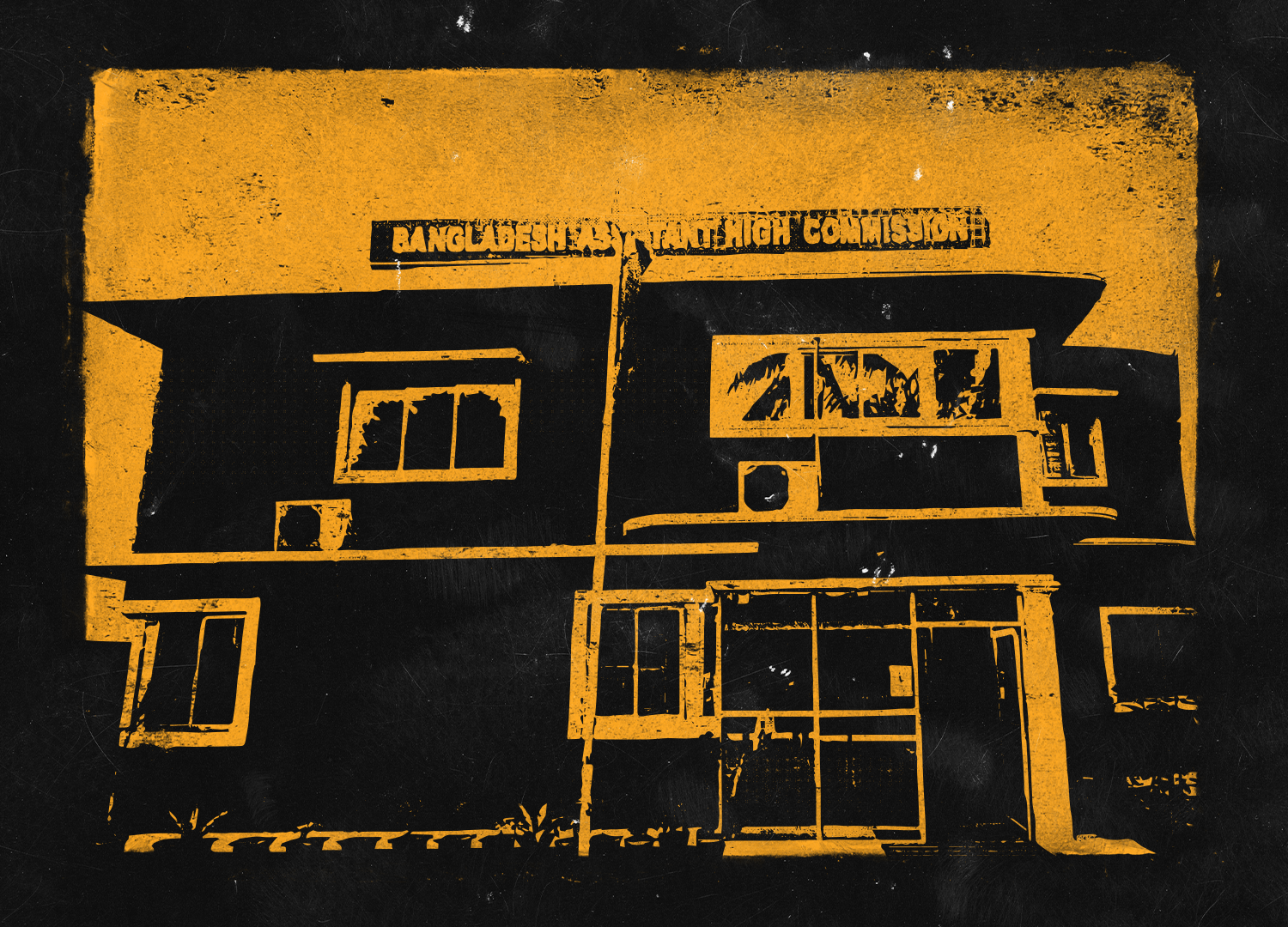
A Hindu nationalist mob from a group closely linked to India’s ruling party stormed one of Bangladesh’s major diplomatic outposts in India on December 2nd, vandalised its premises and tore its flag in an attack that Bangladesh says was carried out in violation of the Vienna Convention on Diplomatic Relations and in the presence of Indian law enforcement.
The Indian Ministry of External Affairs acknowledged — and expressed regret over — the breach in a statement but stopped short of promising any accountability or offering any condemnation.
The attack on the Bangladesh Assistant High Commission in the Indian state of Tripura occurred just days after Bangladesh had formally and publicly called for increased security to ensure the safety of its staff and official establishments in India. Following the latest incident, the Indian government said it would step up security measures.
The Indian government has not responded to an email from Netra News seeking clarification on whether it plans to investigate the perpetrators or its own security lapses, or why it had not strengthened security earlier despite Bangladesh’s prior request.
“An attack on Bangladesh’s high commission means an attack on Bangladesh,” said Shahedul Anam Khan, a retired brigadier general of the Bangladesh army and a foreign affairs commentator. “It was the duty of the Indian police to ensure the safety of Bangladesh’s high commission, which is their obligation and responsibility. But they failed to fulfil it.”
Social media videos and photos of the mob attack and protest show many individuals carrying saffron flags, a polarising symbol of Hindutva nationalism. One video captures individuals tearing apart a Bangladeshi flag inside the premises of the outpost, with at least one person being assaulted by a group of men. Security forces eventually corralled the protesters out of the premises, but there were no apparent arrests or detentions of those responsible for the intrusion.
Since early August, relations between Bangladesh and India have grown increasingly strained after the India-aligned Awami League was ousted from power through a popular uprising, which resulted in the former prime minister, Sheikh Hasina, fleeing to India on 5th August.
The change in Bangladesh’s government has triggered a surge of inflammatory rhetoric in the Indian press and a flood of disinformation and hate speech from Hindu nationalist social media networks, further poisoning bilateral ties, which have been pushed to the brink of a full-blown crisis.
The political upheaval has unsettled the country’s Hindu minority — traditionally supporters of the Awami League — who report an uptick in harassment and attacks. Across the border in India, Hindu nationalist groups have taken the cause of Bangladeshi Hindus as a fervent rallying cry.
The Hindustan Times reported that violent protests in Agartala were organised by the Hindu Sangharsh Samity, an affiliate of the Vishwa Hindu Parishad (VHP). The VHP, an ultranationalist organisation, is best known for orchestrating the demolition of the Babri Mosque in 1992, a cause célèbre for India’s ruling Bharatiya Janata Party (BJP) and a seminal event in India’s pivot to the right.
“VHP is a Hindu militant organisation — anti-democratic and inherently Islamophobic,” said Amit Singh, a postdoctoral researcher of Hindu nationalism at University of Coimbra in Portugal. “It propagates a Hindu supremacist ideology.”
The organisation was founded as a pressure group under the Rashtriya Swayamsevak Sangh, the same umbrella group that presides over the party of Prime Minister Narendra Modi.
“It is difficult to deny the Modi government’s hand in attacks like this,” Singh told Netra News. “These extremist organisations often enjoy impunity — and implicit support — from the state for their acts of vandalisation.”
“The expression of regret from the Indian government seems done out of a diplomatic necessity rather than a genuine concern,” he added.
In its statement condemning the incident, the Bangladesh government invoked the Vienna Convention of 1961, an international treaty that established worldwide diplomatic norms (ratified by Bangladesh and India), less than a week after another violent protest took place in Kolkata of West Bengal, India.
“This particular act in Agartala stands in violation of the inviolability of diplomatic missions, as the Vienna Convention on Diplomatic Relations [of] 1961, asks for,” the Bangladesh statement notes.
Reports also emerged of similar protests in Mumbai. In West Bengal, the chief of the BJP, Suvendu Adhikari, threatened to cut off export of commodities to Bangladesh in a rally near a land port. The state’s chief minister, Mamata Banerjee, known as a moderate in India on Bangladesh, had earlier called for United Nations peacekeepers for the protection of Bangladeshi Hindus.
In Dhaka, the attack is likely to fuel demands for a tougher stance towards India, with interim leader Muhammad Yunus facing pressure from hardliners to purge perceived pro-India elements from the government.
Overnight, students from the Anti-Discrimination Movement — credited with starting the movement that toppled the Hasina government—staged a rally at Dhaka University, calling for “resistance against Indian aggression.”
Asif Mahmud, an Anti-Discrimination Movement student leader and cabinet member, urged the United Nations to deploy peacekeepers to protect Bangladesh’s diplomatic missions in India.●
source : netra.news
